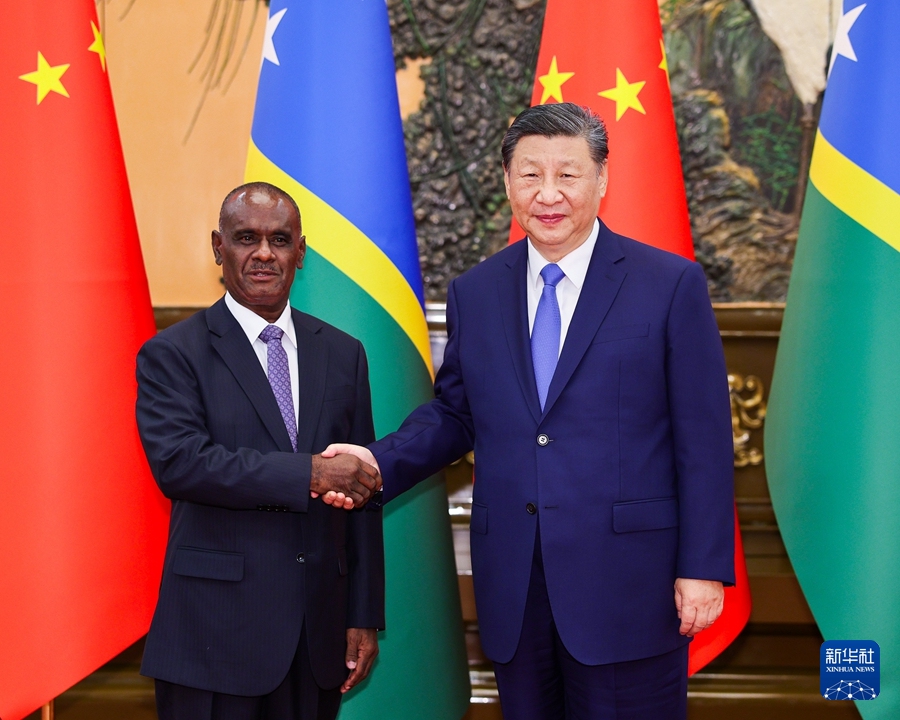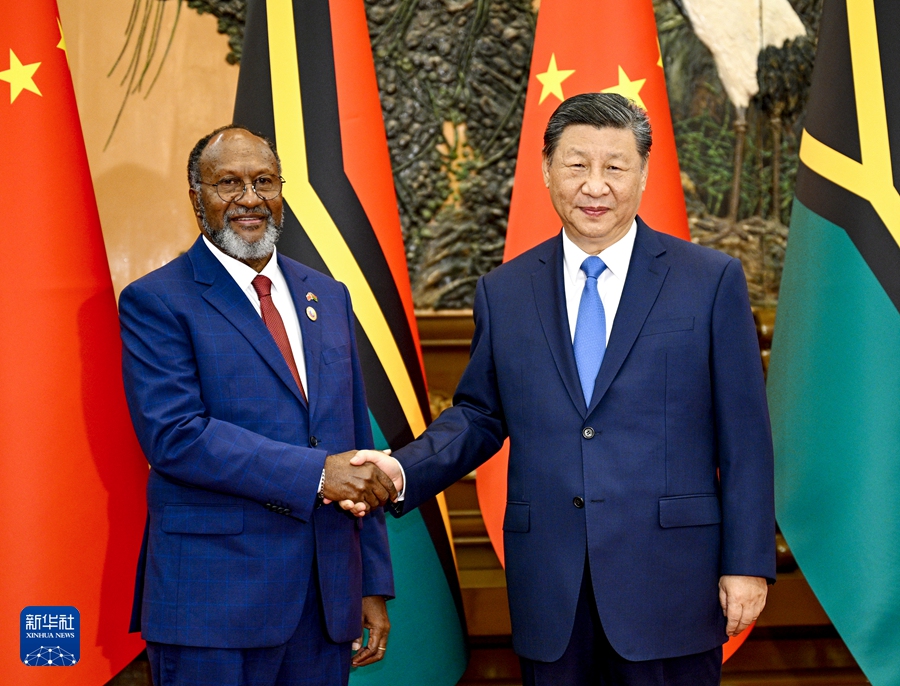
Chinese President Xi Jinping meets with Prime Minister of the Solomon Islands Jeremiah Manele in Beijing on July 12, 2024. Photo: Xinhua
Chinese President Xi Jinping met with Prime Minister of the Solomon Islands Jeremiah Manele and Prime Minister of the Republic of Vanuatu Charlot Salwai in Beijing on Friday.
During the meeting with Manele, Xi said that China is ready to enhance strategic communication with the Solomon Islands to firmly support each other in safeguarding core interests and addressing major concerns, enhance the synergy between the Belt and Road cooperation and the development strategy of the Solomon Islands.
China's friendly cooperation with the Solomon Islands and other Pacific Island countries is a sincere effort to assist these island nations in achieving development, falls within the framework of South-South cooperation, and is part of the common development of the Global South, without targeting any third party or seeking any selfish gain, he said.

Chinese President Xi Jinping meets with Prime Minister of the Republic of Vanuatu Charlot Salwai in Beijing on July 12, 2024.
When meeting with Salwai, Xi said China will continue to provide economic and technical assistance to Vanuatu without attaching any political conditions, to help it achieve development and prosperity.
Xi emphasized that China is committed to equality among all countries, big or small, and adheres to the principle of combining justice with interests while prioritizing justice. China does not seek major-power competition or geopolitical spheres of influence. It does not interfere in the internal affairs of other countries or force them to take sides.
The visits of the two leaders from the Pacific Island countries (PICs) not only deepened the relations between China and the two PICs, but also paved the way for enhanced cooperation that will benefit both sides in various aspects, as well as contributing to regional peace and stability. Unlike some Western countries, China's cooperation with the PICs is based on mutual benefit and win-win outcomes, without targeting any third party or attaching any political conditions, analysts said.
The visits of the leaders of the two PICs demonstrate that China's cooperation with them will be more comprehensive, with the goal of enhanced exchanges to promote mutual development and regional stability and prosperity, Li Haidong, a professor at the China Foreign Affairs University, told the Global Times on Friday.
"China has been fostering strong and mutually beneficial cooperation relations with the Solomon Islands and Vanuatu, and China's assistance to the area, including infrastructure, has made a significant contribution to promoting the economic development of these nations," said Yu Lei, a professor at the Department of International Politics and Economics at Shandong University.
Yu noted that in the wake of the pandemic, the PICs are tasked with expediting economic recovery and growth, while also addressing local employment needs and fostering a conducive environment for economic progress by enhancing local infrastructure development, Yu told the Global Times on Friday.
China is a very important provider of infrastructure and public goods in the Pacific Island region, which has been recognized and praised by the PICs, as they hope to promote the development of local infrastructure through mutually beneficial cooperation with China, Yu said.
The relations between China and the PICs serve as a model for building more mutually beneficial relations among the Global South, and the deep-level cooperation and exchanges will be of great significance to safeguarding the sovereignty and development interests of respective countries and achieving more widespread regional prosperity, Li said.
However, some Western countries have been distorting China's relations and the win-win practical cooperation with the PICs. For example, VOA said on Monday that the two prime ministers' visits came as China is "increasingly competing for influence in the region" with Australia, the US and others. The Australian Broadcasting Corporation also reported on July 4 that some are "questioning the motivations behind China's large infrastructure aid projects in the Pacific region."
Chinese experts refuted such claims, emphasizing that China's support for the PICs is based on local needs, and that China consistently upholds the principles of mutual respect and win-win cooperation.
The cooperation between China and the PICs is focused on mutual benefit and not aimed at any third party, Yu said, adding that the PICs also believe in their right to make independent decisions. Given that they hope to learn from China's successful experiences in poverty alleviation, employment enhancement, and improving living standards, the PICs possess a strong desire and expectation to deepen economic cooperation and other areas with China, Yu noted.
Echoing his words, Zhou Fangyin, a professor at the Guangdong Research Institute for International Strategies, told the Global Times that cooperation between China and PICs in terms of economy and infrastructure is universal and comprehensive, and based on mutually beneficial relations. In stark contrast, the approaches of the US are driven by geopolitical competition, often leading to potential interference in the internal affairs of other countries.
China's approach to international cooperation stands out for its respect for the right of PICs to independently choose their partners for cooperation, whereas the US-led West will inevitably face resistance and opposition from the PICs for not respecting their sovereignty as well as their right to choose their own development path, analysts said.





